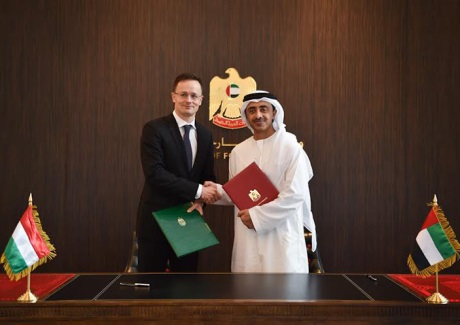Hungary signs cooperation accords with UAE
03 March 2016
Hungary has signed agreements with the United Arab Emirates covering nuclear energy and other sectors, the country's foreign ministry announced on 2 March. The documents were signed during Hungarian minister of foreign affairs and trade Péter Szijjártó's two-day visit to Dubai and Abu Dhabi this week.
 |
| The UAE and Hungarian foreign ministers after signing the MoU (Image: UAE Ministry of Foreign Affairs) |
"The fact that the Persian Gulf nation has the highest per capita electricity consumption in the world, is one of the highest consumers of water and imports almost all of its food requirements designates the main areas of cooperation between the two countries in which Hungarian enterprises can achieve success," Szijjártó said.
Szijjártó noted that the UAE is in the process of building a four-reactor nuclear power plant at Barakah and said that Hungary had agreed to train nuclear engineers and experts in the Middle Eastern country.
Agreement was also reached for Hungarian businesses to play a role in the development of the UAE's renewable energy, food, water management, chemical and air traffic sectors, he said.
The Hungarian Export-Import Bank Plc has opened a $406 million credit line, he added, to facilitate cooperation between companies from the two countries.
"The most important task in this area is for small- and medium-sized Hungarian enterprises to play as large a role as possible in bilateral economic cooperation, because bilateral trade has so far significantly depended on multinational companies," Szijjártó said.
During the visit, Szijjártó met H.H. Sheikh Abdullah bin Zayed Al Nahyan, the UAE's minister of foreign affairs and international cooperation, and they signed a Memorandum of Understanding on setting up a joint UAE-Hungarian committee.
In a $20 billion deal announced in December 2009, Enec selected a consortium led by Korea Electric Power Corporation to build four APR-1400 reactors. Cold hydrostatic testing were completed at Barakah 1 last month and the unit is now over 84% complete, with a start-up target date of 2017. Construction began on unit 2 in 2013, and is now 64% complete, while work began on units 3 and 4 in 2014 and 2015 respectively. Overall, construction of the four units at the site is over 58% complete, the Emirates Nuclear Energy Corporation said.
All four units are scheduled to enter service by 2020.
The plant will supply about a quarter of the UAE's electricity needs and avoid the emission of up to 12 million tonnes of greenhouse gas. The plant will also free up oil and gas supplies for export.
Hungary announced last month that it had agreed to further cooperation with Iran on the peaceful uses of nuclear energy. Szijjártó led talks in Budapest with Ali Akbar Salehi, head of the Atomic Energy Organization of Iran, saying that the two countries would "continue and expand" the training of Iranian nuclear experts as well as establish research and scientific cooperation in the use of nuclear energy.
Hungary operates four Russian-supplied VVER-440 pressurized water reactors, which started up between 1982 and 1987. Though originally 440 MWe gross, these units at Paks have been upgraded and will be modified further to give 500-510 MWe gross. In early 2014, Hungary and Russia signed a cooperation agreement which included the construction of two new VVER reactors of up to 1200 MWe each at Paks. The first new unit is to be commissioned in 2023, with the second following about two years later.
Researched and written
by World Nuclear News